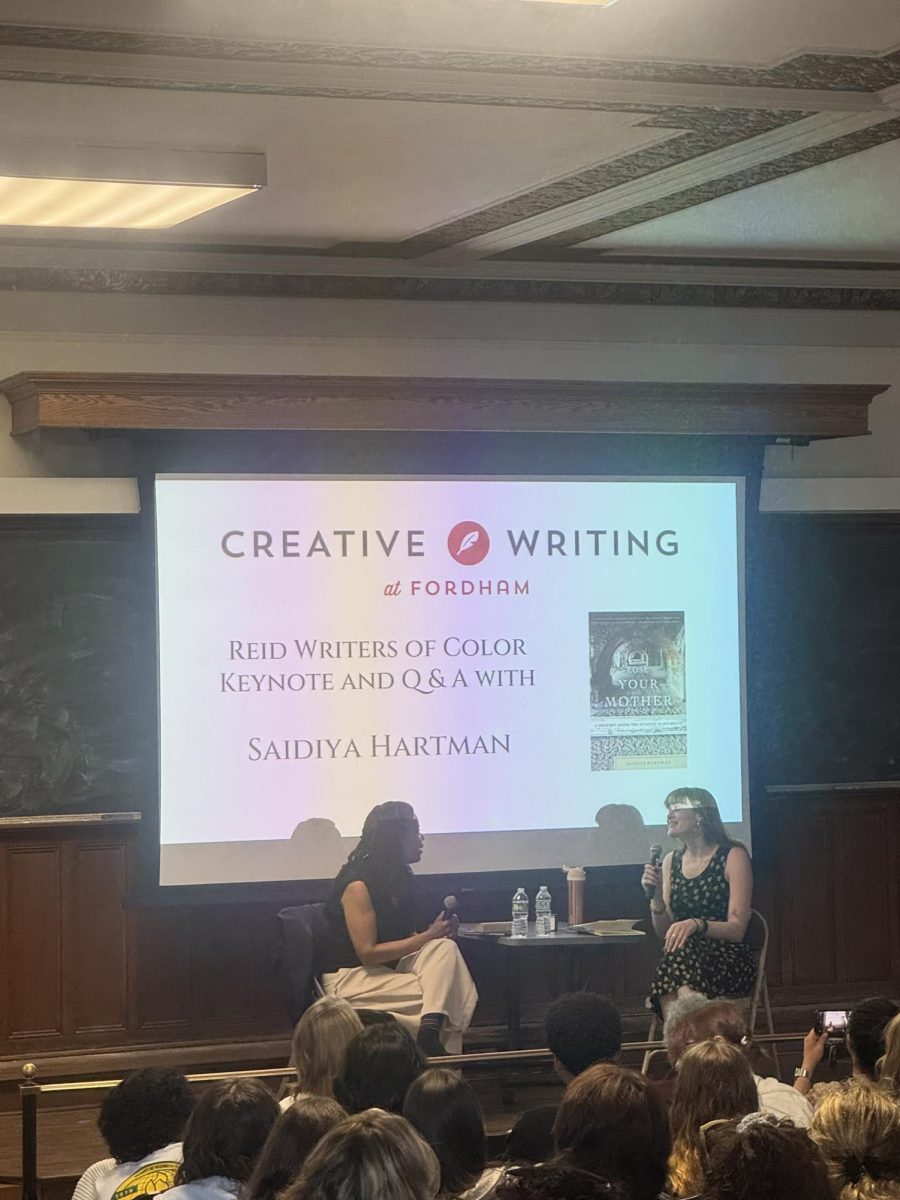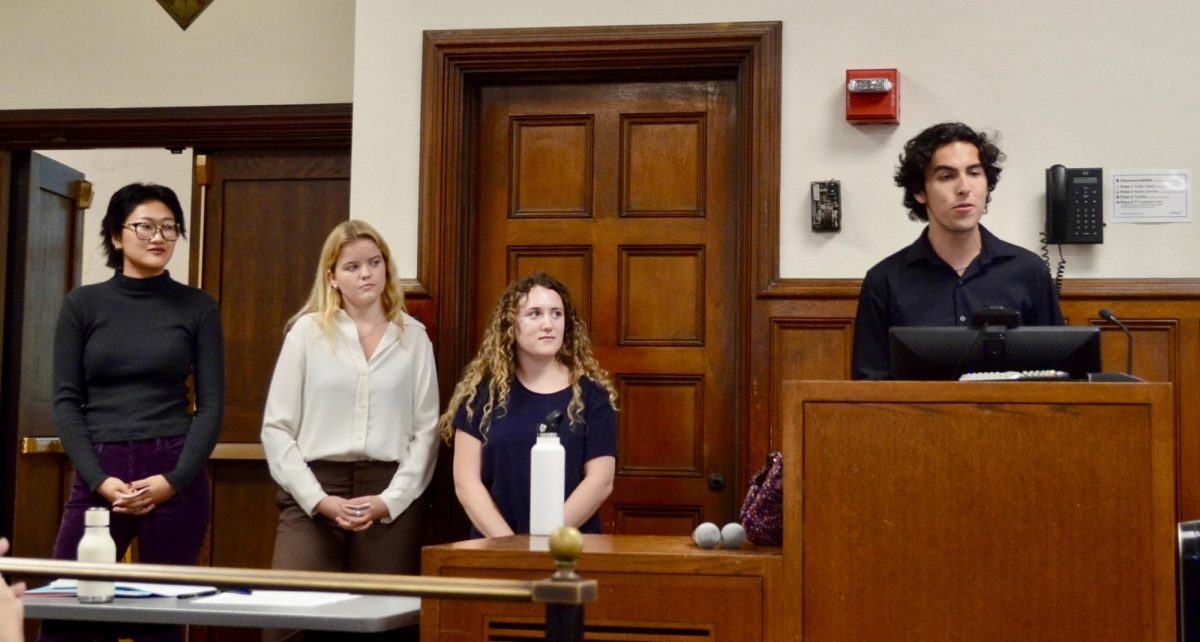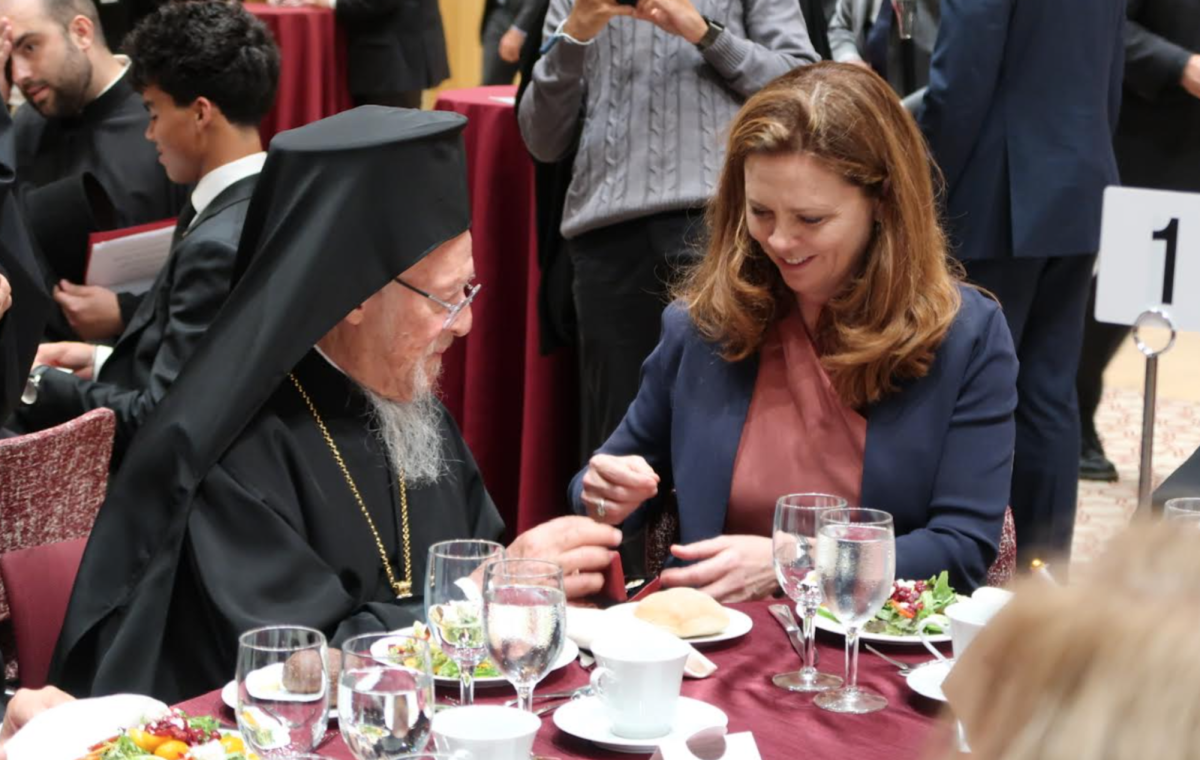Saidiya Hartman delivered the keynote address for the Reid Writers of Color event put on by Fordham University’s English department on Wednesday, April 23. Students and professors alike filled every seat in the Keating 3rd Auditorium to hear Hartman speak.
In her opening remarks, Stacey D’Erasmo, a professor of creative writing in the English department, praised the accomplishments of Hartman and the generosity of Francis Reid and her family in establishing the Reid Writers of Color speaker series in 2008.
The speaker series has brought a procession of some of the most celebrated writers of color to Fordham.
“The Reid Writers of Color Keynote is one of the marquee events of the English Department.” Shonni Enelow, chair of the English department, said. “It brings the most eminent writers of color working today to our students and to the whole Fordham community. It is central to our mission as a department and a university. Students gain exposure to some of the most brilliant writers and thinkers of today.”
D’Erasmo went on to introduce Saidiya Hartman as the author of “Wayward Lives, Beautiful Experiments: Intimate Histories of Riotous Black Girls, Troublesome Women, and Queer Radicals;” “Lose Your Mother: A Journey Along the Atlantic Slave Route;” and “Scenes of Subjection: Terror, Slavery, and Self-Making in Nineteenth-Century America.” Hartman has also been a MacArthur Fellow, Guggenheim Fellow, Cullman Fellow, Fulbright Scholar and a professor of English and comparative literature at Columbia University.
Hartman’s book, “Lose Your Mother,” served as the Reid Writers of Color companion book to her keynote address. In “Lose Your Mother,” Hartman revisits the historical narrative of the transatlantic slave trade by recounting a journey she took along a slave route in Ghana. Hartman emphasized how writing this book helped her look at her method and thereby discover how to tell “a story that wasn’t there,” a story erased by Eurocentric narratives.
Hartman continued with this theme of pushing back on the ways in which dominant historical narratives erase and silence — but also co-opt and feed off of — the voices and lives of people of color.
The main portion of Hartman’s address was an updated version of an essay she previously wrote, titled “Crow Jane Makes A Modest Proposal.” She introduced it as a polemical and satirical essay, encouraging her audience to laugh. She described it as “full of provocations” and “disturbing in a way that’s not redeemable.”
Hartman invited the audience to inquire with her: What does it mean to make an addendum to this piece at this moment? Hartman referenced Olúfẹ́mi O. Táíwò’s idea of “elite capture,” where universities use the “revolutionary language” of marginalized people, but then fail to advocate for them beyond the language they use.
In Hartman’s essay, Crow Jane indulges the Western ideals that downplay or erase the ways in which “progress” has often come at the expense of people of color. Crow Jane “forgets it has always been on trial for some of us.” Her modest proposal offers a vision of reform that is within reach, a vision that “need not be uncomfortable or change our way of life,” a vision only satisfying to people uninterested in justice. The conclusion of Hartman’s essay was met with an enthusiastic round of applause.
One student who attended, Sara Steber, FCRH ’25, said of Hartman’s essay, “Her satirical prose perfectly captures the sheer absurdity of our current political state, and it is inspiring to see that there are still people who are not afraid to speak out.”
After delivering her essay, Hartman reflected on her message. She grappled with the limits of pragmatism and justice as defined by the state. Hartman shared how she, too, struggles with how to challenge DEI as a “language of defeat, the corporatist solution to the demise of affirmative action,” in a time where people also attack DEI as part of a return to the ideals of white supremacy.
She said she wanted her speech to make the audience “think really hard about the situation we’re in” and embrace the “dark laughter” of the piece.
Following Hartman’s piece, Allison Schneider, FCRH ’26, the creative writing program assistant, moderated a short question-and-answer session with Hartman. Schneider called attention to Hartman’s critique of Crow Jane’s pragmatic concessions to white supremacy and asked Hartman how she suggested students actively work against this.
Hartman identified the weaknesses of pragmatism and the exhaustion of political discourse as an opportunity in itself. “In a state of defeat, why not dream the wildest dreams possible?” she said.
Schneider also asked about the role of imagination in racial justice. Hartman referred back to her book, “Lose Your Mother,” and the process of writing it. In the book, Hartman sought to “account for that relationship between imagination and archival research.”
She worked to replace a historical narrative that focuses on the trade of African people as commodities to “create a set of statements about the experience of a captive” and “shift and change the emphasis of archival documents to tell a different story.” Hartman emphasized how important it was to imagine ways in which the same information could tell a different story.
Hartman said she sought to provide a “provocation to those who are ‘on the team,’” urging students to be unsatisfied with the ways in which current movements towards racial and intersectional justice are incomplete.
Clare Cummings, FCRH ’26, attended the event and emphasized its importance for English majors in particular. “Not only was hearing Saidiya Hartman herself read from her essay ‘Crow Jane Makes A Modest Proposal’ incredibly moving, but I also feel that it was a really timely piece to speak on,” Cummings said.
Another attendee, Katherine Brennan, FCRH ’26, agreed, saying, “[Hartman] reminds us that in times where the status quo is threatened, it is also an opportunity to question it, and look for ways we can move forward instead of backward.”
Even after the Q&A ended, many attendees remained in the auditorium, some starting discussions with each other and others lining up to get their books signed by Hartman.
Overall, the event demonstrated the vital importance of centering voices of color at a time when the uncomfortable truths that they bear witness to are under attack, and it gave students the opportunity to critically engage with Hartman’s work.
Editor’s Note: Allison Schneider is also the editor-in-chief of The Ram, but had no role in the reporting or writing of this article.









































































































































































































